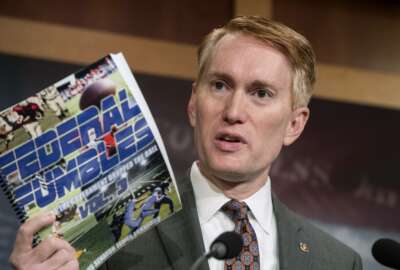

Seemingly runaway federal spending could use today's equivalent of inflation-slayer Paul Volcker.
At a social dinner the other night, a near-retirement friend who is a Senior Executive Service employee of a federal agency asked me whether I thought a government shutdown will occur at the end of next week. Sipping my martini, I said I thought another continuing resolution, perhaps for the whole rest of the year, is more likely.
A third man joined in. “This is just a naive question,” he started. “But all of those impeachment hearings, does it involve everyone in Congress? Are they doing anything to deal with real business?”
It’s easy to denigrate Congress, that beauty pageant for the ugly. Harry Truman knocked the “do-nothing” 80th Congress, making it the centerpiece of his election campaign.
Actually members of Congress do some stuff. This week conferees reached an agreement on the National Defense Authorization Act. Okay, it’s two months into the fiscal year. Still, if passed and signed by President Donald Trump federal employees would for the first time get paid family leave. Starting in October they’d get up to 12 weeks of paid leave for the birth, adoption or fostering of a child, and that’s for both men and women. So that’s something good Congress managed to do.
But, yes, Congress does seem incapable of dealing with the country’s crises. For example, deficits of $1 trillion a year are the foreseeable future. A recent Government Accountability Office report warned that a runaway debt train could make Treasury bond buyers nervous, driving up borrowing costs. Last year, according to the Treasury, the government paid $575 billion to service public debt. The Peterson Foundation said that in fiscal 2021, “interest will surpass the combined amount spent on Medicaid, the Children’s Health Insurance Program, and subsidies for the purchase of health insurance under the Affordable Care Act.” By 2022, it’ll “exceed all mandatory spending other than that for Social Security and the major health care programs.”
But nobody on the Hill talks about it.
I remember when inflation was the scourge of the day. In 1980 I considered myself lucky to find a credit union from which I obtained my first mortgage to buy a condo at 13%. But high interest rates resulted from Federal Reserve monetary policy designed to curb inflation. It was bitter, costly, and politically controversial medicine. Ultimately, though, inflation deflated and hasn’t been a threat since.

Somehow, the inflation produced lapel buttons that read, “W.I.N.” — Whip Inflation Now. They came out during the Ford administration. Luckily President Jimmy Carter called on a more potent force to deal with a situation that was wrecking confidence in the economy: The tall, rumpled economist Paul A. Volcker.
In its obituary for Volcker, the architect of the policies of that era, the New York Times referred to the “Federal Reserve’s brute-force campaign to subdue inflation.”
Volcker, who died last week at 92, also took on many other complicated, difficult challenges, serving in one way or another nearly every post-war president. He was a critic of deficit spending that grew the federal debt. He helped deal with the end of the gold standard. He worked on financial deregulation, but was tough on banks. Later in life he served on many public commissions. His final contribution was a banking regulation known as the Volcker Rule.
Today the Volcker Alliance continues as a good government management institution devoted to workforce, public finance and accountability issues.
So where is the Volcker for the deficit? In the inside-baseball world of government itself, agencies are rightly concerned with the congressional budget process. That is, the fact that the upmteenth continuing resolution runs to Dec. 20, and no one can say what happens after that. Less discussed within agencies, much less in Congress, are the budget trends. On their current course, in a few years they won’t leave any money for discretionary spending on things like running federal agencies.
Copyright © 2024 Federal News Network. All rights reserved. This website is not intended for users located within the European Economic Area.
Tom Temin is host of the Federal Drive and has been providing insight on federal technology and management issues for more than 30 years.
Follow @tteminWFED


